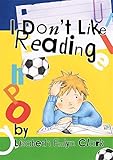I Don't Like Reading ISBN: 9781785923548
Published by Jessica Kingsley Publishers, 2017
There are lots of things Harry likes to do, like playing football or painting dinosaurs, or playing with his best friend, Tom. But Harry REALLY doesn't like reading. He worries about it in school and sometimes wakes up with stomach aches because he's going to have to read aloud that day. His small sister would like him to read to her, but he won't. Words just don't cooperate; they make him dizzy or they seem small or move around and are blurred. Sometimes he has to read sentences over and over because he can't remember what he has read, and his writing and spelling are all over the place too. When he tells mum how he feels about his difficulties, she speaks to his teacher, and together they come up with some ideas that might help. The school's SEN helps too and shows him how to use a ruler under the line to make the words clearer, and he sits with Harry sometimes to help him along. A 'nice lady' appears (an educational psychologist) who uses various games to assess Harry, and she discovers that Harry reads more easily if a green piece of acetate is held over the page. When she reports that Harry has a 'dyslexic profile', he and his mum look this up on the internet and discover lots of famous people who also have dyslexia and find out what this means: 'Mum said it doesn't mean I can't read the books Tom does, it just means I have to try harder.' Once he has the help he needs, Harry is only too pleased to read to his sister; in fact, he doesn't want to stop! The big, simple pictures and very large black print on white pages make this an easy book to read, and the information is spot on. Some of the print looks like a child's early attempts at writing, and some of it is in standard print, but occasionally the text is on top of the picture, which could make reading those bits more difficult. Completely integrated into the illustrations, it gives the information in interesting and understandable form. The brightness of the pictures, Tom's lovable nature, and the positivity of the story will provide much encouragement to children in the process of being diagnosed with dyslexia. Available from Amazon, from good book shops, and from the publisher: www.jkp.com.
Age: 5+
Categories:

